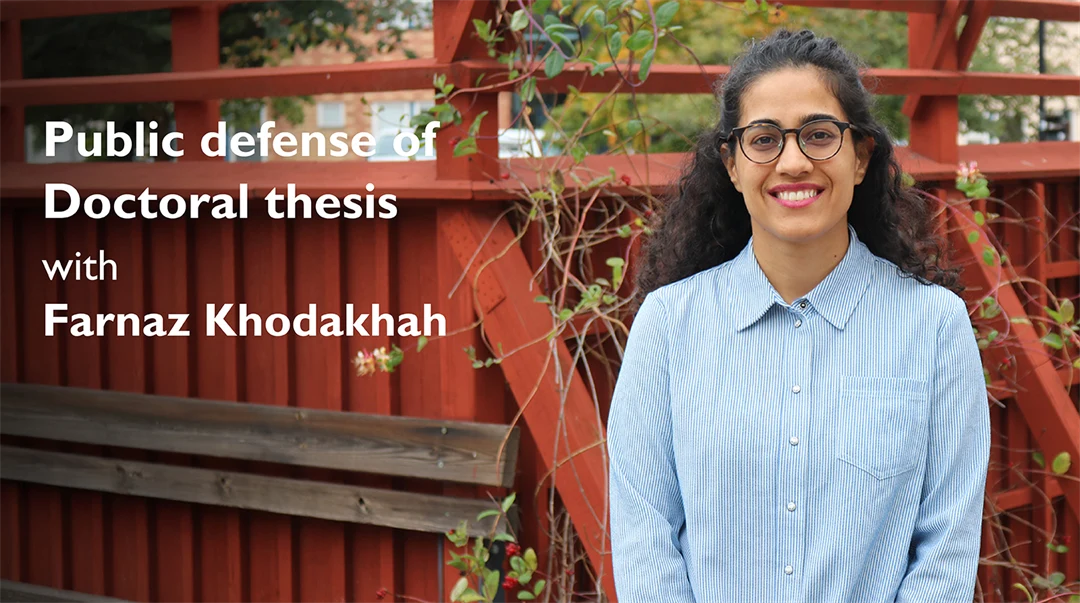Disputation i datateknik med Farnaz Khodakhah
Välkommen till en disputation i datateknik med Farnaz Khodakhah som presenterar sin avhandling "Medium Access Design for 5G and Beyond: Multi-Service Coexistence and Collaboration Strategies".
Farnaz avhandling utforskar innovativa lösningar för medium access (MA) i nästa generations trådlösa nätverk, vilket säkerställer effektiv samexistens och samarbete mellan olika tjänster. Genom att introducera nya icke-ortogonala åtkomsttekniker adresserar detta arbete kritiska utmaningar inom spektral effektivitet, kommunikation med låg latens och adaptiv resursallokering för framtida 5G-nätverk och bortom nätverk.
Datum: 24 april 2025
Tid: 10:15 CET
Plats: Campus Sundsvall, sal M108, M-huset, Youtube and
Zoom: https://miun-se.zoom.us/j/69218651855
(Meeting ID: 692 1865 1855)
Doktorsavhandling: "Medium Access Design for 5G and Beyond: Multi-Service Coexistence and Collaboration Strategies"
Respondent: Farnaz Khodakhah
Handledare och ordförande: Professor Mikael Gidlund, Mittuniversitetet
Biträdande handledare: Docent Aamir Mahmood och docent Patrik Österberg
Opponent: Associate Prof. Israel Leyva Mayorga, Aalborg Universitet, Danmark
Betygsnämnd:
Dr. Hans-Peter Bernhard, Silicon Austria Labs/Johannes Kepler University Linz
Docent Hossein Fotouhi, Mälardalens universitet
Dr. Kia Wiklundh, Totalförvarets forskningsinstitut Sverige
Reserv: Docent Leif Olsson, Mittuniversitetet
Abstract
The transition from 5G to beyond 5G presents fundamental challenges in medium access (MA) design, requiring efficient coexistence and collaboration across heterogeneous services. As networks evolve, MA strategies must become spectrally efficient to support diverse applications, including enhanced mobile broadband (eMBB), ultra-reliable low-latency communication (URLLC), and multi-user augmented reality (AR). To address these demands, this thesis proposes three non-orthogonal MA solutions: cooperative relaying for heterogeneous coexistence, collaborative transmissions for multi-user AR, and MA switching mechanisms for balanced multiservice integration.
The first contribution introduces a cooperative relaying framework using non-orthogonal multiple access (NOMA) for primary-secondary coexistence. A novel piecewise-forward NOMA (PF-NOMA) protocol integrates decode-and-forward(DF) and amplify-and-forward (AF) relaying, dynamically adjusting power and time allocation based on real-time conditions.
The second contribution focuses on latency-sensitive AR applications, wherehigh data rates, low latency, and energy efficiency are critical. A NOMA-based ratedistortion optimization framework is proposed, integrating adaptive power allocation to minimize video distortion while optimizing resource utilization.
The third contribution advances radio access network (RAN) slicing by introducing a hybrid MA framework that integrates NOMA, rate-splitting multiple access (RSMA), and puncturing for efficient resource allocation across slices with competing quality of service (QoS) requirements. By balancing age of information (AoI) and throughput, the proposed solution ensures scalable and adaptive resource management for URLLC and eMBB services.
Extensive mathematical modeling and simulation-based evaluations validate the proposed frameworks, demonstrating significant gains in spectral efficiency, reliability, and energy efficiency across diverse deployment scenarios. This work establishes a unified and adaptive MA paradigm, enabling seamless multi-service coexistence, fostering collaboration, and ensuring scalable resource allocation in future 5G and beyond networks.
